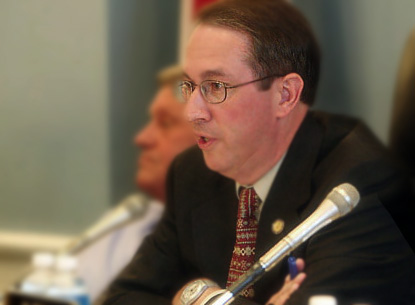Good news for video producers : the
Judiciary Committee has passed the Goodlatte Bill to Modernize the Video Privacy Protection Act . . . Washington, DC, October 13, 2011: Today the House Judiciary Committee passed bipartisan legislation introduced by Congressman Bob Goodlatte, Chairman of the Subcommittee on Intellectual Property, Competition, and the Internet, which updates the Video Privacy Protection Act
 Good news for video producers : the
Good news for video producers : the
Judiciary Committee has passed the Goodlatte Bill to Modernize the Video Privacy Protection Act
Washington, DC, October 13, 2011: Today the House Judiciary Committee passed bipartisan legislation introduced by Congressman Bob Goodlatte, Chairman of the Subcommittee on Intellectual Property, Competition, and the Internet, which updates the Video Privacy Protection Act (VPPA) of 1998 to keep up with today’s technology and the consumer marketplace.

The VPPA was passed by Congress in the wake of Judge Robert Bork’s 1987 Supreme Court nomination battle, during which a local Washington, D.C. newspaper obtained a list of video tapes the Bork family rented from its neighborhood video tape rental store. This disclosure caused bipartisan outrage, which resulted in the enactment of the VPPA.
Rep. Bob Goodlatte writes:
The commercial video distribution landscape has changed dramatically since 1988 . . . With today’s technology, consumers can quickly and efficiently access video programming through a variety of platforms, including through Internet Protocol-based video services—all without leaving their homes. My legislation will ensure that the Video Privacy Protection Act is updated to reflect the realities of the 21st Century
The Goodlatte legislation, H.R. 2471, updates the VPPA to allow video tape service providers to facilitate the sharing on social media networks of the movies watched or recommended by users.
Specifically, it is narrowly crafted to preserve the VPPA’s protections for consumers’ privacy while modernizing the law to empower consumers to do more with their video consumption preferences, including sharing names of new or favorite TV shows or movies on social media in a simple way. However, it protects the consumer’s control over his information by requiring consumer consent before any of this can occur. And, it makes clear that a consumer can opt-in to the ongoing sharing of his or her favorite movies or TV shows without having to provide consent each and every time a movie is rented. It also makes clear that written, affirmative consent can be provided through the Internet and can be withdrawn at any time.
This amendment does not change the scope of who is covered by the VPPA, the definition of “personally identifiable information,” or the privacy standard adopted by Congress when the VPPA was first enacted. Specifically, it preserves the requirement that the user provide affirmative, written consent.”
H.R. 2471 has been referred to the full House of Representatives for further consideration.
Bob Goodlatte
Serving Virginia’s Sixth District
www.house.gov/goodlatte
![]()
Video Privacy Protection Act ~ VPPA![]()
![]()
![]()